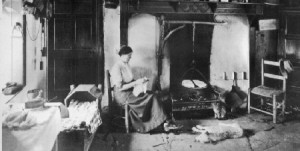Since man first turned the soil with his crude spade, revolutionary changes have merged into a progress which has created new worlds above the soil. But it is still the same soil, and generally speaking producing the same foodstuffs for generally the same purpose.
As each scrape rises, turns and is folded over by the board, the furrow is fresh with dark-brown soil, from which rises a not unpleasant but queerly sour scent of earth. One is gradually minded of some great rtevelation being unfolded: as if the invisible veil of Time itself were being drawn off the great facts, the sacrifices and the stories now in the cold print of the history books. One even feels the close, natural kinship which exists between man and earth – of which only those in constant communion with the earth are aware.
The land was dug with spades before the plough was invented. When I see fields that, within living memory, were spade-dug by man, I marvel at such herculean tasks. Ploughs then were few and far between.
There are a few wooden ploughs still retained for sentimental reasons or as museum pieces. The spade was not been done away with. It is still used for gardens and allotments and for digging round stones which the plough must pass over. I have seen ploughmen with fast teams thrown clear of the handles after hitting such a stone. Though most of the great ones are well-known. Their location is passed down from generation to generation – as is the location of underground shores or drains.
” …. an’ about two perches out from the big bush in Paddy’s Hill field there’s a bad stone! Now, watch yourself there! I remember being thrown … “
It is such hidden stones that make the blacksmith’s forge “thronged ground” during the ploughing season, for almost everyone who enters has a sock to be mended or ‘squared’ or pointed with steel. The ‘sock’ by the way is a detachable part of the plough which fits onto the sole-plate and which cuts the scrape underneath. The ‘coulter’ – an iron knife on the forward beam, slices the sod.
In the forge the men talk of the incidents which occurred during their labours that day; about teams, ploughs and horses; and then go to their homes with the mended socks in readiness for renewed work the next day.
It seems a humble calling: but all great labours are remote and inconspicuous. For the song of the plough sings gently of the most distinguished labour in the civilized world. Men labour that men may live when clay-clogged footsteps walk in fresh brown furrows after a team of pulling horses.
… end …

“For the song of the plough sings gently of the most distinguished labour in the civilized world.” Hear! Hear!